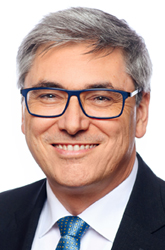Issues & Answers Special Advertising Section:
December 2021

Marcus Winter
President and Chief Executive Officer
Munich Re US

“Given the changes in our risks we need to focus on sufficient margins in our portfolio as well as a very good alignment of interest between insurers and reinsurers.”
Our whole world seems to be getting more risky at an unprecedented speed. Our business is the transfer of risk. If we weren’t concerned about that, we would not be a good reinsurer. We work diligently to understand the risk, assess the risk, weigh the risk, structure it properly and then take it on and work with brokers, with the clients and with the ultimate insureds all along the value chain.
How did those issues translate into the Jan. 1 renewal season?We have a range of big topics right now that affect the whole industry—insurance-related inflation far beyond the consumer price index, especially in pockets like used cars or labor costs and costs for construction material. Those things cause a lot of uncertainty. Also, regarding the legal system, some of the verdicts that we see show that the social inflation is not over. Beyond that, we are still in an environment with extremely low interest rates, meaning not a significant return on assets. Topping that off, we have both climate change and cybercrime on our plates.
What are you seeing surrounding the cyber market?
The cyber market is one of our big growth opportunities globally. Munich Re is one of the largest providers of cyber insurance capacities and cyber reinsurance capacities. But with rate increase you cannot really address the quality of the portfolio. When you look at traditional insurance covers for homes, for cars, for companies, those risks usually are fairly static. On the cyber side, every day of the week, one change in your software architecture or one new piece of software can significantly change your cyberrisk profile. Therefore the quality assessment of the underlying cyberrisk is a core part of the underwriting process.
When it comes to climate change, what has you most worried about it and how are you addressing it?
First of all, I think that the insurance industry in total, this year and in the past years, has done a very good job addressing climate change. We have supported millions of families and businesses to rebuild what they had lost. That’s what the industry should do. On the primary insurance side, a broad range of losses have meant an increase in rates and adjustments in coverage. For risks such as wildfire or severe convective storms, we have made significant progress. But events like the winter freeze in Texas earlier this year show that we cannot completely capture all the exposures in smart models. That’s not just a topic in the climate change area. We also did not expect that one cargo ship could block the entire Suez Canal, or that one verdict would be in the hundreds of millions for a risk thought maybe to be in the tens of millions. Therefore, we have to expect that unexpected events do occur—on the climate side and beyond. That’s why we need to make sure that our models cover the things that can be modeled, and that our margins also cover the things that cannot be modeled.
Anticipating risks early on, driving innovation and delivering solutions closely tailored to our clients’ needs is Munich Re’s pledge. Learn more at: https://www.munichre.com/us-non-life/en/solutions/reinsurance.html.